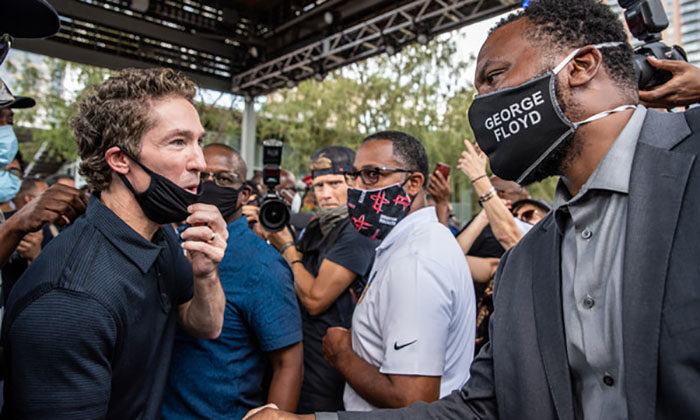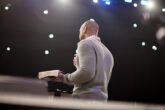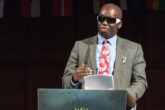
Pastor Joel Osteen participated in a march that went from Discovery Green to City Hall, USA with support from the local chapter of Black Lives Matter. | Getty Images/Sergio Flores
Days after marching with thousands in a George Floyd demonstration in downtown Houston, Texas, televangelist Joel Osteen said Monday that he thinks Floyd’s death represents a “turning point” and the incident “ignited” something in him.
The 57-year-old Osteen, who rarely makes his political opinions public, told African American Pastor John Gray during an hour-long conversation on race and the church Monday that issues of injustice and inequality are not political issues.
“I stay away from political issues but this is not a political issue,” Osteen said. “This is a human issue. Wrong is wrong and we want to lend our voice — you know this — but to stand with our black brothers and sisters and stand against injustice and the things that have been wrong.”
Osteen, the senior pastor of Houston’s Lakewood Church, one of America’s largest evangelical megachurches, was among many who marched last Tuesday in Houston against instances of police brutality and to pay tribute to Floyd.
Floyd was a 46-year-old Houston native who had moved to Minnesota to start a new life following several incarcerations, including a felony conviction for aggravated robbery with a deadly weapon in Texas. On Memorial Day, a store clerk at Cup Foods in Minneapolis called 911 to report that Floyd had given him a counterfeit $20 bill to purchase cigarettes and that he appeared to be intoxicated.
After he was arrested and handcuffed at the scene, Floyd refused to get into the squad car, “fell to the ground, and told the officers he was claustrophobic,” according to details in a criminal complaint against former officer Derek Chauvin who was later fired and charged with second-degree murder for kneeling on Floyd’s neck for over eight minutes, even after Floyd had stopped moving and breathing.
Video of the incident sparked nationwide protests and renewed condemnation of instances of police brutality and calls for defunding police departments.
Osteen also participated in #BlackOutTuesday, a social media hashtag movement in which users posted pictures of black squares to show solidarity with the African American community.
“I know we can do better. I think this incident with George — and it’s not just him, it is what it represents — I feel like it is a turning point,” Osteen told Gray. “It has ignited something in me about, as I said, what can we do better.”
Osteen stressed that as “terrible” as Floyd’s death was, he is hopeful because “God takes what is meant for harm and He knows how to bring some good out of it.”
“But I do believe that we have to be open and acknowledge the pain, seek to understand, grieve with you and realize that you have it more difficult than us,” Osteen told Gray, who served as an associate pastor at Lakewood before moving on to lead Relentless Church in South Carolina.
“Then again, God knew you were going to be you and He knew I was going to be me. So let’s take what we have and let’s move forward with it.”
Osteen stressed that Lakewood Church, which founded by his father, has stood in unity for 60 years.
“You couldn’t possibly know the power of this moment, not only for the body of Christ but for particularly, black people,” Gray told Osteen.
“There are so many people in the African American community who love you and love your wife and love the work of this church. They may know you from a television broadcast, but I have had the honor and privilege of being in a relationship with you for over 11 years now. Having seen your life up front and up close. And to know your heart is one thing, but to have this moment for other people to kind of step into what I know and what I believe is a critical moment for leaders to get off the fence.”
Gray agreed that the issue at hand is not political, but rather “spiritual” and “human.”
“For you to not just be a global pastor, but the pastor Lakewood Church in Houston, where George Floyd was from — Third Ward — it was critical for you to have a moment like this so we can talk about the pain,” Gray said.
Osteen recalled an incident that occurred with his wife, Victoria, at a bookstore at Houston Community College a few years back that opened his eyes to the hardships that many black and impoverished people face across the U.S.
He said his wife went down to the college bookstore to buy books for their kids who were taking classes at the school while they were still in high school.
“The place was packed with young African American kids with people in this itty bitty room. Victoria walks in, this white beautiful girl, and she gets in the back of the line. They asked what she was there for. She said she was there to get some books for her children,” Osteen explained. “They said, ‘Do you have cash, have money?’ She said, ‘Yeah, I have money. I am going to buy them.’ They said, ‘you can go to the front of the line. We are all waiting for financial aid.’”
“I thought, how can they get ahead when they are sitting there waiting in line and waiting for somebody to give them a $40 book,” Osteen continued. “It’s hard enough to raise kids and get ahead these days, [but] when you see how much is against some people you think, ‘how can that happen?’
Osteen again reiterated that “we are here to learn how can we do better.”
Gray suggested that churches that have access to capital and resources can look to partner with colleges and commit a certain portion of their mission budgets to help impoverished people who are trying to better their lives through education. He suggested churches should partner with historically black colleges or universities.
“I think that is something that should be considered. Because when we think of missions, we think of places that don’t have access to resources and capital, where people have been disenfranchised. Well, if that is really what missions is about, you can look down the street,” Gray said.
“I think that churches, particularly white churches that have money in the bank, … you can help with your relationships: you know the bank president, you know the mayor, the county commissioner, you know the president of that college. Tell some of these corporations to put some money into a pool and let’s get 100 kids and let’s pay for their books and let’s give them a stipend so they don’t have to go to work and they can just focus on their education.”
Gray stressed that if several churches did such a thing in every community, there would be an “immediate response and return on investment.”
“What you said about Pastor Victoria’s experience at Houston Community College is critical, because you got kids in line who have the stress of trying to learn with the added burden of not being able to have the financial resources to do so without having to take two or three jobs and student loans that are going to add debt,” Gray said.
“So even after they get that degree, they are going to be paying for that degree before they can put a down payment on a house. Now, that hinders my ability for how I want to plan out my family.”
The conversation between Gray and Osteen at Lakewood Church is part of Gray’s series titled “A Necessary Conversation.” Last week, Gray held a similar conversation with Steven Furtick, pastor of the popular Elevation Church in North Carolina.
“Churches need to respond in real-time to systemic injustices they see within their communities to bring solutions,” Gray said in the conversation with Furtick. “George Floyd dying on TV with a knee on his neck was our Emmett Till moment where we see the brutality and the lack of humanity that we can literally not ignore any longer.”

